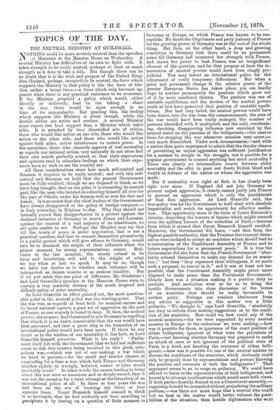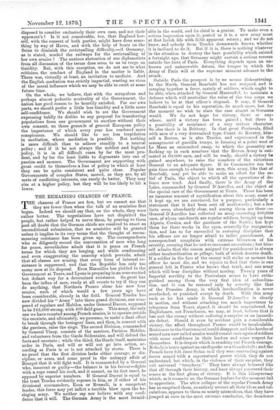TOPICS OF THE DAY.
.■41,1■■■
THE NEUTRAL MINISTRY AT GUILDHALL.
NOTHING could be more severely neutral than the speeches of Ministers at the Mansion House on Wednesday. A neutral Ministry has difficulties of its own to fight with. It takes strength to be really neutral, perhaps at least as much strength as it does to take a side. But though there can be no doubt that it is the wish and purpose of the United King- dom (Ireland, perhaps, excepted) to be neutral, the force which supports the Ministry in that policy is like the force of fric- tion, rather a latent force,—a force which only becomes ap- parent when there is any practical resistance to be overcome. If the Ministry proposed a policy which would, either directly or indirectly, lead to our taking a share in the war, there would be signs enough in no time of its unpopularity. But pending this, the feeling which supports the Ministry is silent enough, while the hostile critics are active and restless. A neutral Ministry must expect less loud support than a Ministry which takes sides. It is attacked by three dissatisfied sets of critics, those who would like action on one side, those who would like action on the other side, and those who would like action against both sides, active interference to restore peace. In the meantime, those who sincerely approve of real neutrality as regards our national action, very naturally do not often find their own minds perfectly neutral, so that their expressions and opinions tend to stimulate feelings on which their expo- nents have no wish to see the country act.
All these considerations show how much self-control and firmness it requires to be really neutral ; and with this self- control and firmness we hold that the present Government must be fully credited, though we are disposed to think, as we have long thought, that on one point it is overacting its neutral part, like the man who insisted on colouring himself all over for the Dart of Othello, under his dress as well as over his face and hands. It is no secret that the chief leaders of the Government have always disapproved of the policy of foreign conquest,— in Italy yesterday, in Belgium to-day. Why they should not formally record that disapprobation in a protest against the declared intention of Germany to annex Alsace and Lorraine, against the consent of a vast majority of its inhabitants, we are quite unable to see. Perhaps the Ministry may say that till the treaty of peace is under negotiation, that is not a practical question, and that to commit themselves prematurely to a public protest which will give offence to Germany, would only be to diminish the weight of their influence when the proper moment for strong representations comes. Reti- cence to the last moment, the steady refusal to be fussy and interfering, will add to the weight of what we say when at last we speak. It may be so, though we have our doubts as to whether such reticence will be interpreted as decent reserve or as anxious timidity. But if we put aside this one point of difference, Mr. Gladstone's and Lord Granville's speeches at the Mansion House seem to contain a very masterly defence of the much despised and difficult policy of strict neutrality.
As Lord Granville in effect pointed out, the most question- able point in the neutral policy was the starting-point. That the war was, as regards at least both its nominal excuse and its broad national aspects, a pure act of aggression on the part of France, no one scarcely is found to deny. If, then, the neutral powers, one or more, had threatened to join Germany in repelling that attack, it is no doubt conceivable that the war would have been prevented, and that a great step in the formation of an international police would have been made. If there be any doubt as to the wisdom of our neutrality it lies heie, as Lord Granville himself perceives. What is his reply ? "Parlia- ment itself felt with the Government that we had not sufficient cause to risk this country being involved in this great, cala- mitous war,—which was not of our making, a war which we tried to prevent,—for the small and slender chance of suspending for a time a war, which both France and Germany whether rightly or wrongly, believed, sooner or later, would inevitably occur." In other words, the causes tending to bring about this war were so numerous and so deeply-rooted, that it was not the occasion for a faint attempt at the formation of an international police at all. In three or four years the war had been on the eve of bursting out three or four separate times. Count Bismarck himself seemed to think it so inevitable, that he had evidently not been unwilling to precipitate it by forcing on a question of little moment to Germany or Europe, on which France was known to be sus- ceptible. No doubt the illegitimate and petty jealousy of France. for the growing power of Germany was at the root of the whole. thing. But then, on the other hand, a deep and growing conviction in Germany that there could be no permanent peace till Germany had measured her strength with France,. and shown her power to beat France, was no insignificant element of the question, and for that purpose at least the in- tervention of neutral powers would have been simply pre- judicial. You may invent an international police for the adjustment of really temporary differences. But when a. great and permanent change in the relative power of the- greater European States has taken place, you can hardly hope to contain permanently the passions which grow out of it by mere combined threats. The position was one of unstable equilibrium, and the devices of the neutral powers could at best have preserved that position of unstable equili- brium. But had they failed, the neutral powers would have, been drawn into the war from the commencement, the area of the war would have been vastly enlarged, the number of passions identified with it multiplied, and the cold, overstrain- ing, checking, disapproving influence now exercised by the neutral states on the passions of the belligerents,—the reserve force for stopping the war whenever occasion may occur,— very much diminished. Under such circumstanees,—and with. a nation then quite unprepared to admit that the slender chance- of preventing an unjust aggression was sufficient justification' for a menace to mingle in the struggle, was it possible for a popular government to counsel anything but strict neutrality?' There was clearly no intermediate course between strict neutrality and the offer to pour out freely British blood and wealth in defence of the nation on whom the aggression was made.
But if neutrality were right at first, it has clearly beeo right ever since. If England did not join Germany to prevent unjust aggression, it clearly cannot justly join France to prevent an aggression which is only the punishment of that first aggression. As Lord Granville said, the true policy was for the Government to hold aloof with absolute impartiality, and watch its opportunity for effective media- tion. That opportunity came in the form of Count Bismarck's circular, describing the horrors of famine which might succeed even the military horrors of the reduction of Paris,—horrora from which it seemed that Count Bismarck himself recoiled.. Moreover, the Government did learn, "and that from the highest possible authority, that the Prussian Government them- selves were inclined to accept an armistice which should lead to. a convocation of the Constituent Assembly of France and to future negotiations for a permanent peace." It is true the Government did also learn that the French Government "abso- lutely refused themselves to make any demand for an armis- tice ;" but then "they expressed their willingness, if we made such a proposal, to concur in it," and it was at least not im- possible that the Constituent Assembly might prove more disposed to make peace than the Provisional Government. Clearly here was a situation making it a positive duty to. mediate. And mediation went so far as to bring the hostile Governments into close discussion of the terms. of an armistice that should be really favourable to neither party. Perhaps our resolute abstinence from any advice or suggestion in this matter was a little pedantic, "We thought it," says Lord Granville, "absolutely our duty to refrain from making suggestions as to the condi- tion of the armistice. How could we, how could any of the neutral countries,—for we were supported by every neutral country in Europe in the endeavour we were making,—how was it possible for them, in ignorance of the exact position of either belligerent, ignorant of what were the provisions of Paris,—not knowing whether Germany was prepared to make an attack at once or not, ignorant of the political state of Paris, in a word, not knowing the resources of either belli- gerent, —how was it possible for one of the neutral nations to. discuss the conditions of the armistice, which obviously could only be properly done by representations and persons knowing the position and resources of both the belligerents ?" That argument seems to us to verge on pedantry. We could have offered to listen to the representations of both belligerents, and honestly to attempt combinations which would meet both views.. If both parties heartily desired to see a Constituent assembly,— supposing it could be assembled without prejudicing the military position,—was there not more hope that a neutral who could feel no heat in the matter would better exhaust the possi- bilities of the situation, than hostile diplomatists who wErS
disposed to consider exclusively their own case, and not their opponent's? Is it not conceivable, too, that England her- self, with the consent of both parties, might have done some- thing by way of Havre, and with the help of boats on the Seine to diminish the revictualling difficulty,—if Germany, as is stated, needed the railways for the revictualling of her own armies ? The anxious abstention of our diplomatists from all discussion of the terms does seem to us to verge on timidity. But, with this exception, we do not see to what criticism the conduct of England in the matter is liable. There was, virtually at least, an invitation to mediate. And the English mediation was strictly impartial, wasting no atom of the moral influence which we may be able to exert at some future time.
On the whole, we believe, that with the scrupulous and perhaps almost pedantic neutrality of the Government, the nation has good reason to be heartily satisfied. For our own parts, we should prefer a little less timidity and a little more self-confidence. We should wish to see the Government expressing boldly its dislike to any proposal for transferring populations from one government to another without their own consent, on those grounds of general European policy the importance of which every year has rendered more conspicuous. We should like to see less trepidation in mediation, where mediation is possible. But nothing is more difficult than to adhere steadily to a neutral policy ; and if it be not always the noblest and highest policy, it is in all difficult cases by far the most pru- dent, and by far the least liable to degenerate into one of passion and menace. The Government are supporting with great credit to themselves a line of policy in which at least they can be quite consistent and quite clear. Popular Governments of complex States, moved, as they are, by all sorts of conflicting interests, can rarely do better. They may aim at a higher policy, but they will be too likely to hit a lower.



































 Previous page
Previous page